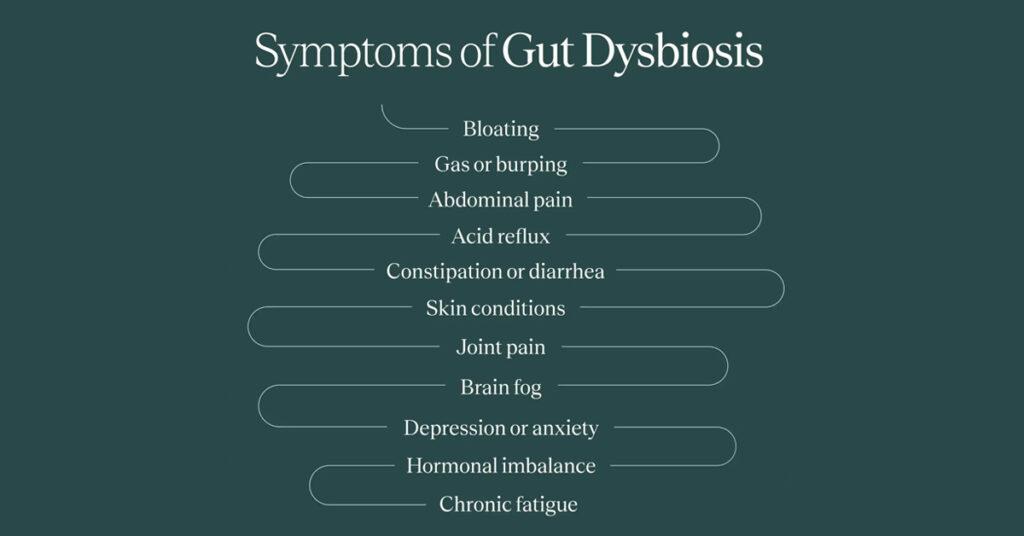Imagine your gut is like a bustling city. Each street is filled with hardworking citizens, all doing their part to keep the city running smoothly. There’s a department for digestion, a police force for immune defense, a mental health office that handles mood regulation, and even sanitation workers that keep things clean. This city is
alive and thriving, thanks to the community of bacteria and other tiny organisms that
call your gut home. But what happens when things start to go wrong? When the
balance of this city falls apart? Welcome to the world of dysbiosis.
A Gut in Balance In a healthy gut, there harmony—a perfect balance between good bacteria (theones that help you digest food, fight off harmful invaders, and even keep your mood
in check) and not-so-good bacteria (the troublemakers, lurking but kept in line).
These microbes work together, and everything stays in order.
But sometimes, the troublemakers get out of control. It’s as if the bad guys took over the streets, causing chaos in every corner. The good bacteria are overwhelmed, and the once thriving city of your gut falls into disarray. That’s when dysbiosis steps in.
The Unseen Enemies: Causes of Dysbiosis
what could throw your gut off balance?
1. The Antibiotic Fallout: Ever had to take antibiotics for a sore throat or an infection? While these meds are great at killing harmful bacteria, they also wipe out some of the good guys in your gut. Without enough of the good bacteria around, the troublemakers see their chance and take over. Think of it like a city with fewer
cops—the criminals start running wild.
2. The Junk Food Trap: Picture your gut bacteria as picky eaters. They love fiber from fruits, veggies, and whole grains. But feed them a diet heavy in processed foods, sugary snacks, and fast food, and the good bacteria start to starve. Meanwhile, the bad bacteria thrive on junk. like throwing a party for the bad guys and wondering why everything falling apart.
3. Stress—The Silent Saboteur: Ever notice how your stomach seems to tie itself in knots when you stressed? That’s because stress affects your gut. It’s like a massive power outage in your city—nobody’s functioning right, and all systems go haywire.
4. Infections and Medications: Sometimes, a bad infection or medication can shake up the balance, leaving the delicate ecosystem struggling to recover. Signs Your Gut is Crying for Help When dysbiosis happens, your gut doesn’t stay quiet about it.
Here’s how it might show up:
– Digestive Distress: You feel bloated, gassy, and uncomfortable. You might find yourself running to the bathroom too often or not often enough.
Food Foes: Suddenly, your favorite foods are turning against you. The bread you
loved now causes bloating, or that slice of pizza makes you regret every bite. – Skin in Revolt: Breakouts, rashes, or conditions like eczema may pop up unexpectedly. Remember, your skin reflects what’s going on inside.
Mood Swings: Feeling anxious or down? Believe it or not, your gut has a hotline to your brain called the gut-brain axis. When the gut’s in chaos, it can send distress signals upstairs, leaving you feeling off.
Exhaustion: No matter how much sleep you get, you’re still tired. The gut is bessential for absorbing nutrients. When it’s in trouble, your body may not get what itneeds, leaving you fatigued.
Bringing Balance Back: How to Fix Dysbiosis If your gut’s in trouble, don’t panic. You can bring order back to your internal citywith a few simple steps.
1. Probiotics: These are like reinforcements for the good guys. Found in fermented foods like yogurt, kimchi, sauerkraut, or in supplement form, probiotics can help repopulate the good bacteria.
2. Prebiotics: Think of these as the fuel for the good bacteria. Foods like garlic, onions, bananas, and whole grains help feed the beneficial microbes, giving them the energy to fight back.
3. A Gut-Friendly Diet: The more fiber, the better! Load up on fruits, vegetables, whole grains, and legumes. Limit processed foods and sugar, which tend to empower the bad bacteria.
4. Mind Your Stress: Managing stress isn’t just good for your mind—it’s essential for your gut. Meditation, yoga, deep breathing, and regular exercise can help keep stress at bay.
5. Say No to Unnecessary Antibiotics: Only use antibiotics when absolutely necessary, as overusing them can wipe out the balance of good bacteria in your gut.
A New Chapter for Your Gut
-
Your gut is an incredible, complex community that thrives on balance. Dysbiosis can throw everything off, but with a little attention and care, you can restore harmony to this important system. By taking charge of your diet, managing stress, and being mindful of medications, you can support your gut’s return to its peaceful, balancedstate.
-
So, the next time your stomach feels out of whack, remember—it might just be your gut city trying to regain its footing. Take care of it, and it will take care of you, too.
This blog mixes storytelling with easy, relatable language, making the concept ofdysbiosis accessible to everyone. Let me know if you’d like to adjust anything!

